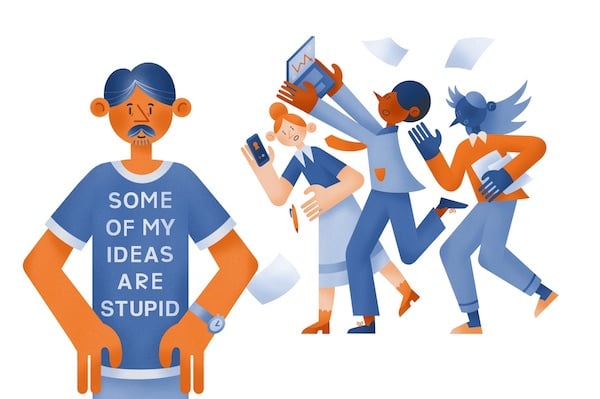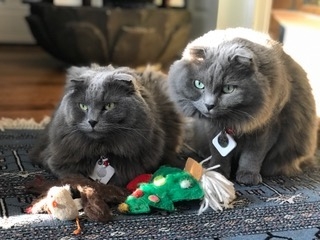
|
So, I got a little frisky after hearing the same thing from a number of leaders and whipped up a fluffy piece of flash fiction based on actual conversations. To balance out that silliness, this week we have a guest essay from a former president who returned to the faculty in 2015 (yes, the good old days) after eight successful years. This essay is a reminder of what a current president said when I wondered why anyone would want the job: “Every day I get to talk to these amazing people.” Then he added, “And I never have to explain again what a provost is.” And coming soon, a guest essay from a current president: "The Magical Power of Football." |
Apple Pie DayDuring a break in a board meeting, one of the trustees complained about the brownies. There were always brownies at these things. Why couldn’t there be other desserts? Why not tiramisu? Why not trifle? The president, a little overcaffeinated and punchy from days of long meetings, said “Here’s an idea. We could ask dining services to create an Apple Pie Day.” The trustee laughed and said, “Who doesn’t love apple pie?” A lurking cabinet member overheard and explained to the leadership team: “The president wants to create an Apple Pie Day.” They began an Apple Pie Initiative, with a subcommittee to explore crust versus crumble. The chief budget officer looked into planting an orchard. The VP for student affairs produced spreadsheets to anticipate how many slices each student could be counted on to devour—would the football team balance out cross country? A data team worked on a regression analysis seeking to determine how many rotten apples could spoil the whole barrel. The provost, who had applied for but did not get the president’s job and had failed to find placement elsewhere, asked to have an off-campus meeting with Professor Jones. While that distinguished professor never attended the (frequent) open budget meetings, he also just didn’t believe the budget. There was, he knew, money hidden somewhere. And if the president weren’t such an idiot, surely the answer to the institution's financial crisis was clear: get rid of football and use all that cash to fund more lines in academic departments. In Apple Pie Day, Professor Jones has found the perfect rallying cry to rouse the faculty from complacence against an evil administration. He had, after all, spearheaded The Great Whiteboard Eraser War a few days after the president took office. From the English department, Professor Dick prepared a memo to the faculty senate arguing that apple pie is an expression of the imperialist, corporate, non-academic bent of the president. Apples are an overrepresented fruit and highlight the hegemony of the West. Pie was not inclusive of those who can't tolerate gluten. And, everyone knows blueberry pies are superior to apple. The student government association learned of the idea and argued that pies are elitist. What was wrong with cake, especially yellow cake with chocolate buttercream frosting? The school newspaper ran an editorial that reasoned “a lot of people have had birthdays that weren't celebrated and only old people like pie.” Outside Main Hall, students protested with signs that read “Let us eat cake!” The president, meanwhile, had been out of town courting donors, meeting with alumni, lobbying legislators, going over architectural plans for a new science center and renovations to the art museum, attending conferences, responding to media requests about an upcoming speaking engagement, hearing from lawyers about FOIA requests, and got back to campus to a faculty senate that had voted no confidence in the president, the board of trustees, and all but one of the leadership team because of Apple Pie Day. What Apple Pie Day? The president only vaguely remembered mentioning it. As a joke. The next day in the office, the president wore a t-shirt that read: SOME OF MY IDEAS ARE STUPID. |
|
We want to hear from you. |
Guest Essay on Being and Doing the PresidencyThe writer is a former president As I was preparing to leave my long-time academic home for a presidency at another institution, a fellow dean—and former president—laughingly told me that “being president is fun, but doing president, not so much.” That made sense to me. Living in a nice house, having the power to make meaningful changes, and being paid a handsome salary sounded appealing. Confronting the highly public crises that seemed to afflict so many presidents, not so much. I plunged in, trading security for possibility. I like being president well enough. As a gregarious person, the social aspects of the presidency were not hard for me. I enjoyed the public speaking and ceremonial events. I liked meeting friends of the university, old and new. The ceaseless travel introduced me to many people I would not meet otherwise. But doing presidential work was satisfying in a different way, for it involved collaborating with colleagues to perform the work behind the scenes to sustain the institution. I grew to respect and relish the work that each member of the president’s cabinet performed. I had come up through the ranks as a humanities faculty member and thus had little understanding of what business and finance involved. I had long been a sports fan but had no idea of the complexities the athletics director faced. I had prided myself on keeping up with the latest advances in computing but had not glimpsed what was involved in maintaining information technology for a complex institution. I had lived much of my career in libraries but did not comprehend the immense labor that went on behind the scenes. I had taught thousands of students but had not considered what it took to persuade them to choose our school from among hundreds of other opportunities. I had helped individual students through hard times but did not appreciate the skills demanded of those who dealt with students in times of crisis, far beyond the classroom or faculty office. I had not considered the courage required of a chaplain who confronted issues of loss and death on a daily basis. The range of legal issues faced by a general counsel was daunting, and so were the challenges of building and managing an endowment on which thousands of people depended. I was never the expert in our cabinet meetings. There was always someone who knew more about any particular topic than I did. My job was to see the totality of the institution in ways that no one else could. In the course of a day, I would meet a 17-year-old prospective student in the morning and an 88-year-old alum in the afternoon. I would meet with architects with thrilling plans and then with faculty concerned that they would lose a space crucial to their work. I would speak to alumni groups and community members concerned about some new direction the university was considering. My job was to orchestrate these disparate activities into institutional progress. The work often held little glamour or visibility. A large part of each day involved listening to ideas good and bad, deflecting or advancing requests in polite ways that did not waste an opportunity nor insult people, that did not establish an unwise precedent or commit the university to an investment of money or good will that precluded better uses of each. The most consequential work was often seen by only a single person and had no immediate result. I discovered that a problem avoided was worth two problem solved, that a quiet conversation without obvious consequence might end up mattering more in the long run than a large public meeting. I found that the loudest people were not always the most influential, the most friendly not always the most sincere. Ending someone’s relationship to the university with courtesy but firmness was hard but necessary, as was resisting trustees accustomed to having their way. The satisfactions proved to be the opposite of what I had imagined the presidency would involve. The successes came less from exerting bold authority than from using subtle influence. The advances often unfolded over years, long after my term had ended, rather than in exciting moments of triumph. Kindness and modesty proved more powerful than any overt exercise of power. The attractions of being president were seductive. It was fun being the center of attention. It was tempting to believe that I was as witty, smart, or important as people pretended. But as one reception, speech, and ceremony followed another, the symbolic role of the job became less fulfilling. Even the most inspiring line grew dull with constant repetition. I decided to end my term not because I was tired of the long hours behind the scenes, of doing the work of president. Instead, it was being president, of living on a perpetual stage, that seemed to have run its course. A new person could bring fresh energy and inspiration. For my part, I was happy to cede the stage to the next temporary star, taking satisfaction in the work I had done with friends and colleagues. |
The Litter BoxWe believe in diversity, equity, and inclusion. We believe in access. We know the field isn’t level but think everyone should get to play—not just those with pedigrees and good breeding but also the scrappier ones who may have had a rougher start in life. This applies to institutions (community colleges as well as research universities), leaders (the Ivy-all-the-ways and those who came from less “traditional” backgrounds), and animal companions (we're not speciest). This is the only place where Insiders can show their snouts (beaks, whiskers) wearing institutional affiliations or school colors.  Rose and Blue Trombley (she/her), Southwestern University |
